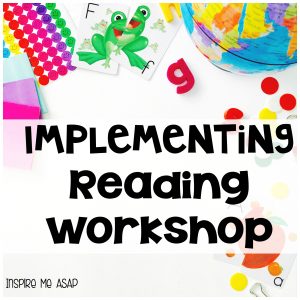
I know what you’re thinking…first graders and second graders JUST reading that entire time???? Third graders, I can see that but first and second grade!?!?! YES!!! How is it possible??
READING WORKSHOP!!!
Let me rewind and explain how I got to this point….
My first few years of teaching first and second grade, I used literacy centers. All of my focus was on learning how to implement guided reading groups effectively and I did not have enough time and energy to learn about the best, most effective practices that the OTHER students should be engaged in.
I spent LOTS of money at Lakeshore Learning and other teaching stores buying commercialized products for my students to be “engaged in.” I spent lots of time writing grants to fund the literacy centers. I spent lots of time cutting, gluing, stapling,and getting ideas online for how to make cute centers. I had parent helpers, family members, my boyfriend (a fourth grade teacher)…EVERYONE help me make centers. I made several different center charts and center rotations and experimented with which one worked best. I spent a lot of time teaching the directions and behaviors that I expected when the students were at literacy centers. My students seemed to like these activities. They liked interacting with their peers and liked having choices about what they were working on that week.
However, after a few years, I began to question all the time, money, and energy I was spending on centers and wondered if there was a better/easier/more effective way. I was getting the hang of this guided reading thing, even getting pretty good at it, and was ready to tackle the “what the other students are doing” issue. Were they really engaged in reading?? I was beginning to have these thoughts that I did not like pop into my head…how could I just “get rid” of everything that I spent so much time on!?! What other options were there?? After looking online on what other teachers did with their students during reading, I found that there was something called “reading workshop.” I didn’t really understand it at first and was pretty skeptical. Unfortunately, my district did not provide any professional development about a reading workshop approach. In fact, my district expected that our students be “engaged in literacy centers” and did not seem to support my **new** thinking about a workshop approach. So, I started to spend my money on awesome teacher resource books and I started to spend my time reading those books! ![]()

These books teach about using a reading workshop approach to teach reading.
I had many light bulb moments when reading these books! I LOVED the focus for the teacher: less is more, work smarter, not harder, and keep it simple. I LOVED the message for the students even more!!!!
Big ideas about reading workshop include:
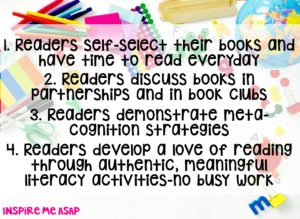
After spending my summer researching and learning all I could about reading workshop, I was ready to start it with my students that fall. After all, I was already using writing workshop, so how different could it be…right!?
I began reading workshop with my second graders and used reading contracts with them. When I met with my students for guided reading groups, the other students were JUST reading…and writing. Writing about their reading that is!! The reader’s contracts were a packet of graphic organizers that we already reviewed during shared reading. The contracts gave my students the opportunity to read a just-right book of their choice and write about their thinking- all independently. And guess what!?! It “worked!” My second graders did great! They loved it! I loved it!
Now that I teach third grade, I only use the reader’s contracts with a few of my students. These special needs students benefit from the extra guidance the contracts provide. My other students however, “JUST READ!” It is awesome!!! I meet with groups at the guided reading table, look up at the rest of the students and sometimes I am still amazed. They are all in their own just-right reading spot, with their just-right reading book, with their book bin (or book shelf as Kathy Collins suggests!), and are reading! Some readers are flipping through their reader’s notebook and making notes about the day’s mini-lesson. A few readers are frantically writing their connections, visualizations, or thick questions on sticky notes. Other students are just reading. :)
So how does reading workshop look in my classroom??? First, here is my daily schedule from last year: 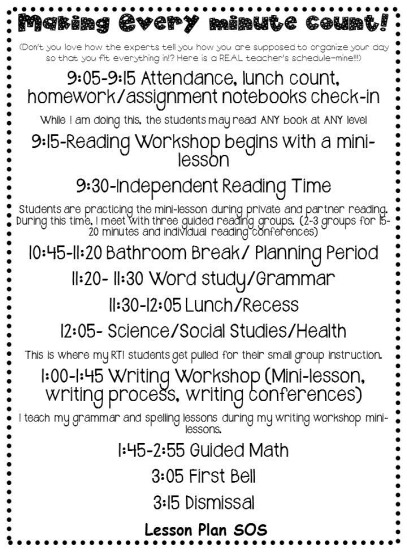 Making Every minute count!
Making Every minute count!
Here is a break down of Reading Workshop in my classroom.
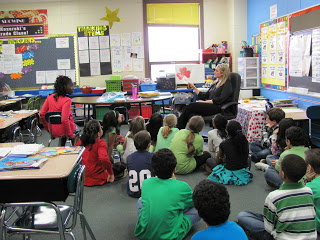

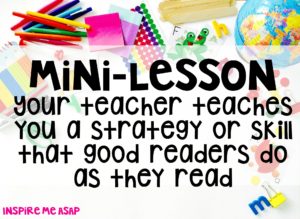

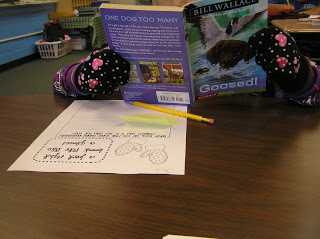
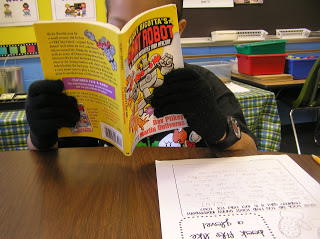
Warning: Your students will not want to take their gloves off after teaching this lesson!! In fact, even though I taught this lesson in October, my students insisted on keeping their just-right reading gloves all year long in their desk!! I was happy to oblige even though we got a few weird looks from other teachers/students who walked into our classroom when we were reading and wearing our just right gloves! :)

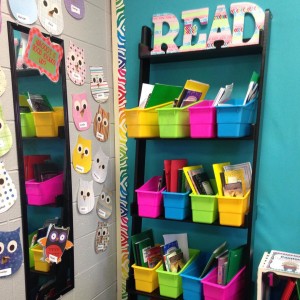
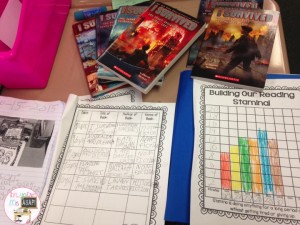
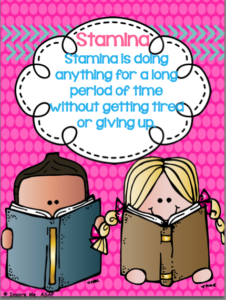
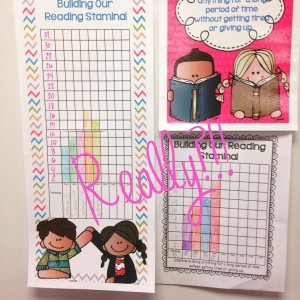
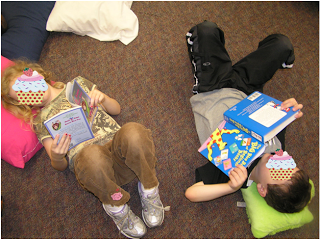
I keep track of my mini-lessons I teach in a couple of places. One of the places is the bulletin board that all students can see:
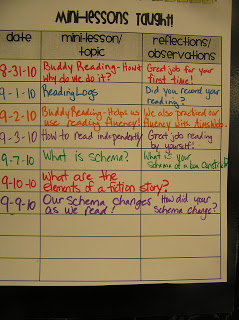
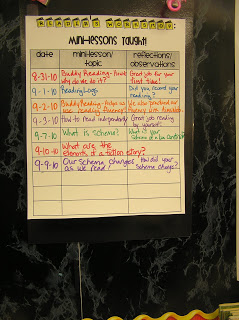
After the mini-lesson, students are ready to “just” read! :) But, it is so much more powerful than that!
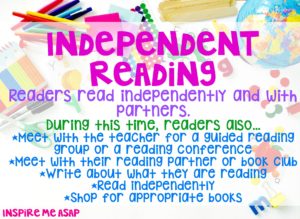
At this time, readers are engaged in reading just-right books that they choose at their independent readying level. Readers practice the skill/strategy that the teacher taught during the mini-lesson. The teacher provides instruction during reading conferences and guided reading groups. Readers also write about what they are reading in their reader’s notebooks, talk about books with other readers, buddy read to practice fluency, meet in literature groups and book buddy meetings, and read independently.
Here is an example that I actually use with my students!
I have run 2 marathons!
Reading partners read a book that is at their “just-right reading level” and a book they mutually agree on. (You can get double copy books from your library or Scholastic book orders!) Reading partners are assigned when I learn more about my students as readers and and find out who has a common interest/reading level. For example, I might have one girl who is an F&P instructional reading level of P and another girl (or boy!!) who is an F&P instructional reading level of Q. They also have a common interest of reading mysteries and their personalities complement each other they will make perfect reading partners! Reading partnerships and book buddies are a great way to get your students TALKING about books! It provides your students with the opportunity to discuss literature in a meaningful and engaging way.
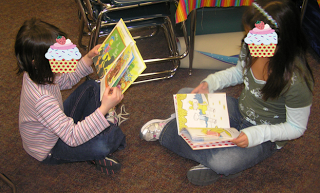


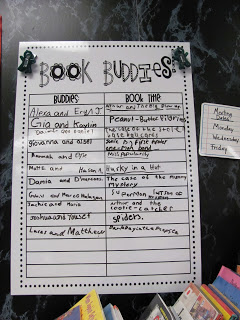
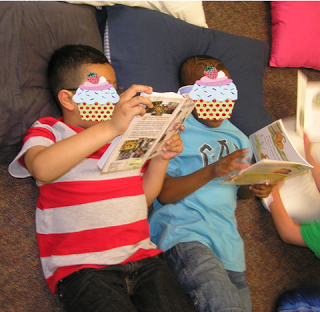

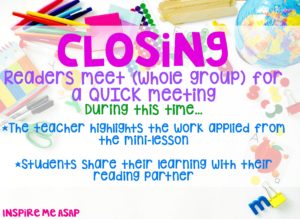
The teacher BRIEFLY highlights the mini-lesson from the day. The teacher may highlight the work applied from the mini-lesson by explaining what a specific reader did that day. Students share what they did during their independent reading time with their reading partner. For example, a student might say, “Today I read about twisters in the National Geographic book. There were two words that were unfamiliar to me. Let me share them with you.”
I saved the best part for last….celebrations!!! Everyone loves a good celebration! I knew I loved Kathy Collins book when she emphasized the importance having celebrations in honor of your readers!!!
Here are a few of the celebrations we have: 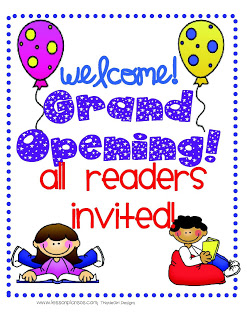


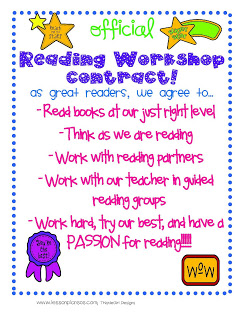
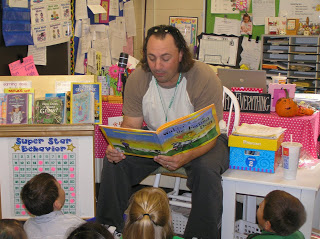
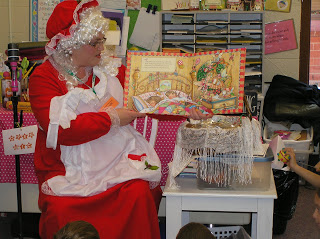
Mrs. Claus was so kind to bring in cookies and milk for her read aloud.
As you can see, it does not take a lot to get your readers even more excited about reading!! Just throw in cookies and it is a celebration!!! :)
Wow..long post. Now you can see why we waited to write these posts during the summer!!! I am very impressed if you are still reading at this point! :) If you take one thing away from this post…have it be this: good readers become great readers by READING, “simply” reading just right books independently. I believe whole-heartedly that this workshop approach to teaching reading (and even writing and math) is the way to go with so many of our students who NEED differentiated instruction and small group instruction. As Sharon Taberski emphasizes in her book, highly qualified teachers and not programs are the most important thing to the success of our students. It is actually quite scary, yet empowering, to know the impact that TEACHERS, solely teachers, have on our students!
Reading Workshop Resource:
Implementing a reading workshop approach to teach reading does not have to be stressful! When you take the time to establish routines and set expectations for your readers, you will see them flourish into a class of life long readers who have a deep love for reading.
This will be your go-to resource to help you implement reading workshop in your primary classroom. It will take you step by step by listing different mini-lessons that you will teach to make reading workshop a success! Most importantly, it will inspire your students to develop a love for reading time.
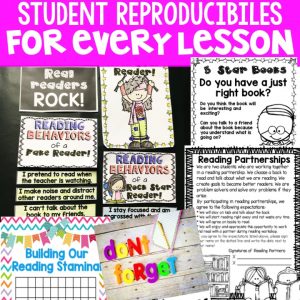
There are 23 mini-lessons that are included in this file, which focus on establishing routines and setting expectations for implement reading workshop with your students.
Mini-lessons include:
**Detailed lesson plans
**Colorful posters for you to print for your anchor charts
**Reproducibles for your students
During this unit, readers will learn to:
-Follow the structure of reader’s workshop (mini-lesson, independent reading, closing)
-Self-select books that “fit like a glove” from the classroom library
-Take a browse through the classroom library for just-right books
-Take ownership over the classroom library by cleaning book baskets and organizing books
-Use a book check out form to check out books in an organized manner
-Use library stick holders to aid their book shopping
-Use a shopping schedule to check out books on an assigned day
-Use book nooks to keep all their reading materials organized
-Celebrate the grand opening of the classroom library
-Commit to expected reading behavior- RW contract signing party
-Demonstrate specific behaviors of real readers (this includes a fun rockin’ reader art project)
-Build their reading stamina and chart growth
-Use reader notebook’s
-Read with a reading partner during reading partnerships
-Demonstrate expectations for reading partnerships
-Work together to solve problems that arise during reading partnerships
-Read with their partner and discuss the text
-Meet with the teacher for a reading conference
-Reflect on their reading partnerships
Click HERE to purchase Reading Workshop on Teachers Pay Teachers.
Save 10% by purchasing Reading Workshop directly from my website.
Or, you can save big by purchasing the Reading Workshop BUNDLE: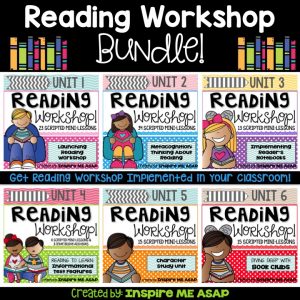
How do you rock reading workshop in your classroom????
Enough about us, we can’t wait to hear YOUR rockin’ reading workshop ideas!!!

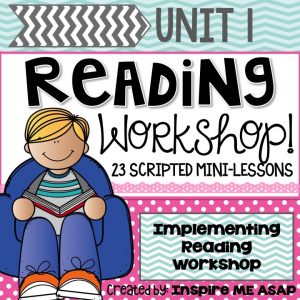


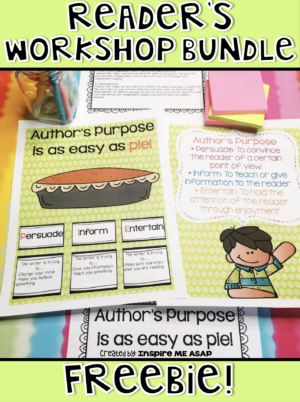

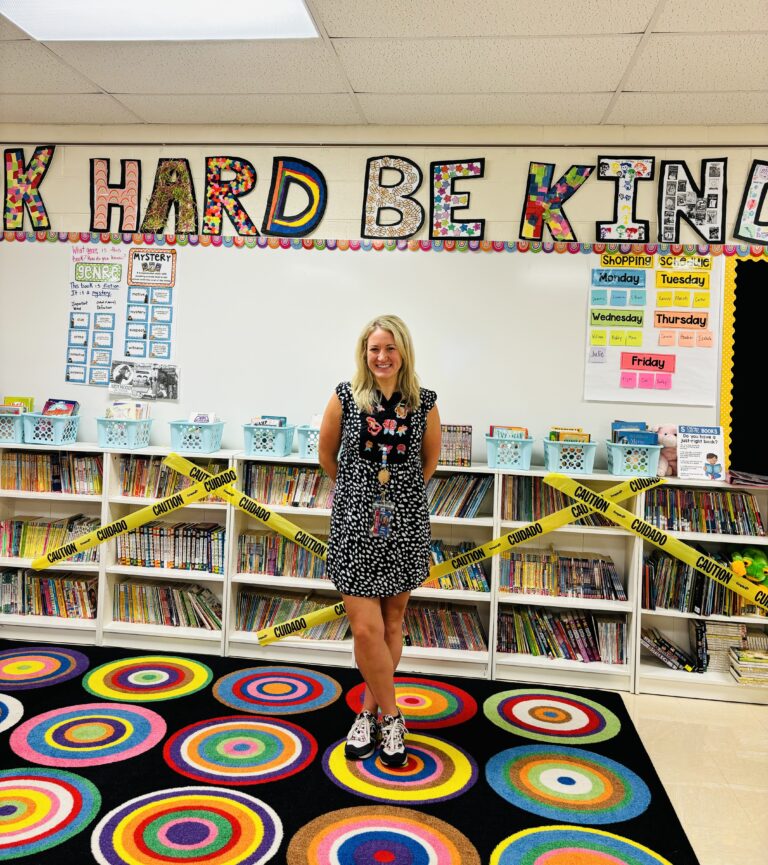



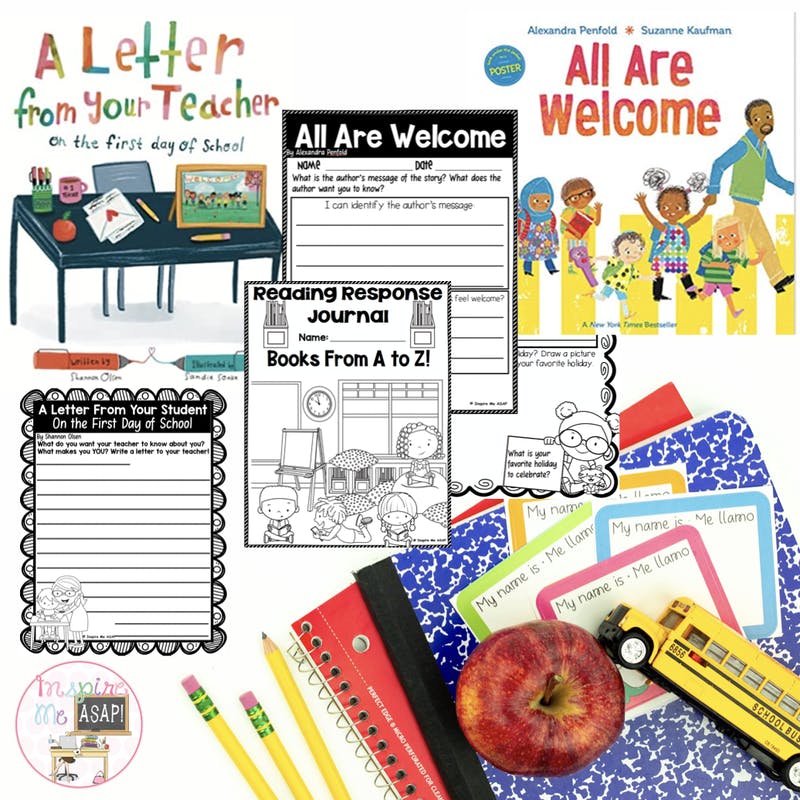
48 Responses
This is amazing! I have been reading up on Reader's Workshop because I am not having luck with literacy centers. This year I am co-teaching so we decided to dive head first into Reader's Workshop. Both of us will be doing guided reading while the other students are reading their chosen books and completing different assignments depending on what we are learning. I am definitely going to use your ideas!
Faithful in First
Just in case:
pinksmyink@gmail.com
Janine
Faithful in First
For reading workshop, I start every lesson with a mini-lesson then the kids will go on and read a book by themselves, listen on tape/cd, read with a partner, and work on writing. I use the Daily 5 and CAFE. I also do featured reader so everyday a student will read a book to the class. Everyone gets the opportunity to become a featured reader. While the kids are reading independently, I will confer with students one-on-one or have guided reader groups.
missnguyensclass.blogspot.com
email is stnguyen1@seattleschools.org
This comment has been removed by the author.
I start each lesson with a mini lesson and then my students apply that skill to their reading. While students are reading they are recording their observations in the Reader's Workshop Journals. Before Readers Workshop is pver we come back together and discuss what we've learned from our text. I'm currently do a book study over Reader's Worskop right now.
Thanks for posting.
Mrs. Shepherd
mysecondgradejournal.blogspot.com
oh geez! Now I have another wonderful resource to buy! I too used to run myself ragged with centers. I secretly hated them, but was too afraid to admit it! I used the Daily 5 setup for workshop last year (my first year in 2nd) and really liked the chopped up blocks for my little kiddos and myself-admittedly ADD teacher. I am toying with not having any other options but independent/partner reading this year. I love the idea of graphic organizers and thinking maps for the contracts. I am sure I will have some boogers who need that all year! I think my comment is getting as long as your post! Thanks for all you guys post! Love it!!!
Rachel
http://www.mrslambsclass.blogspot.com
diiiiiid we just become best blog friends? I think so. LOL.
it's suuuuper nice to see someone else rant and rave over Kathy Collins. I have the biggest teacher crush on her.
I feel like we speak the same language and I love it!!
mrs tabb =)
First Grade Awesomeness
p.s. I'm going to facebook/twitter your sight because you ladies are awesome and workshop is awesome. period! =)
mrs tabb
Thanks for this post! Reading instruction is my summer plan (after summer school ends) so I have been studying all the blog posts! I bought Kathy Collins' book for my kindle after reading this. Reading instruction has always been an area of difficulty for me and I've cycled through centers, packets of skills, pure reading, and a mixture of them all. Other teachers in my grade level do lots of worksheets (including other subjects like math practice, which I disagree with). However, I'm the newbie on the team so I have learned to keep my mouth shut after all my ideas are shot down. It's nice to see others working to put the children first so I can be inspired to think outside of the small box my school is stuck in!
I am SO happy you posted this! Thank you! Thank you!
I use the Daily 5 and Cafe..or parts of it…but always looking for new ideas for my reading block…. Your Rockin Reading Workshop File looks awesome!! I love your blog!!
hollie.booth@blairschools.org
I love reading workshop! It totally changed my thinking about kids and reading and teaching when I started teaching through RW a few years ago. I am a Kathy Collins mega fan, too. I saw her speak here in Ct. a year or so ago, got her autograph, and put it on my facebook wall cause I was just so dingdang happy. You really hit the nail on the head with this posting!
I was blessed to intern with an amazing teacher who was already a pro at Reader's and Writer's Workshop. I've never thought for a SECOND about teaching in any other way! Loooove Reader's Workshop. I had an interesting experience this year when I moved to a more challenging school in my district…. my first graders had a much more difficult time managing reading independently. If you ever run into this problem, I gave them a lot less independent reading time and gave them much more partner reading time. Towards the very end of the year, we broke it down like it was September again and talked about what good readers were going to be doing, what they would look like, what it would sound like, etc. I didn't even meet with students during the week when we were really hammering in these expectations, I was moving around the room, making sure they were all READING, not just staring at the book. We started doing book shopping more often to keep interest high, and we set a HUGE goal for ourselves. They were reading maybe 10 minutes a day. We set 30 PERFECT reading minutes as our goal for the end of the year. And step by step, we attempted one more minute every day. I honestly didn't think they would make it to 30, but they did! It was amazing. A huge realization for me about how much I really needed to break it down for them, even if I'd already done it. Reteach when necessary! :)
"Growing Readers" made a huge impact on my teaching! Thank you for sharing your ideas and processes. I'm printing this post!
ReadWriteSing
I teach first grade. I love this concept and I purchased/downloaded your pack from TPT. I am still doubtful that my first graders will be successful. I wanted to purchase the two books you cited but I am having trouble finding the Guiding Reading and Writers. I have only been able to find a copy designated for Grades 3-6. A little help…
How do you assess your students?
I started writer's workshop with my first graders about 4 years ago and then started reader's workshop with the next year. It was AMAZING to see how it transformed my class and my way of teaching. The kids loved it and by the middle of the year they knew the routine backwards and forwards. They knew exactly what was expected of them. This is such a great post!!!
P.S. have you read Reading with Meaning by Debbie Miller?? It is a great book for Reader's Workshop ;o)
love it!!! off to purchase this. What is the star font called? I love it!!
Ashley
http://www.justreed-ashley.blogspot.com
I'm glad you posted this too. I've always felt sort of guilty for not doing centers or other activities during my reading workshop. My first year teaching my principal handed me the Guided Reading and Writing book and told me to do it just like the book said, so I had never done anything else.
Reader's workshops are brilliant. I am a strong believer in building up reading stamina.
I think you are amazing for sharing your resources so beautifully. TpT was down last night when I tried to purchase your resource, so am off to shop right now.
Keep sharing – we are loving it.
Wow! This is awesome! I've tried my hand at reader's workshop for 3 years now, and I still don't feel like I've got it right. Thanks for sharing your ideas! I'm definitely going to check out your packet on TPT.
A Day in First Grade
This is an amazing post! Thank you for sharing. I just purchased your file. I am also a follower and I am adding your button to my blog. Will you do the same for me?
☮Monica
The Schroeder Page
Thank you so much for this post! Going to check out your pack on TPT now!
Thanks!
Jen Meyer
I just found your blog, and I LOVE IT!
http://quenchyourfirst.blogspot.com
This looks awesome! I purchased your Reader's Notebook on TpT and I tried to redownload the file, but the Rockin' Readers Workshop was not there. Any suggestions? Dying to read this!
Mrs. Laird-as far as I know the Guiding Reading and Writers is only available for grades 3-6. I checked the Fountas and Pinnell web site and that's all that was listed.
Also, there was a question about how we assess students during reading workshop.
For us, we start the year with reading interviews where we ask the kids about what types of books they like to read, what they do when they come to a tricky word, if they think reading is easy or hard, etc. We also hold informal reading conferences where we look through their book selections (are they choosing books at their just-right level, what genres are they reading, are they completing their reading contract choice boards) and look at what strategies they are using. We also look through their reading logs to see how many books they are reading and what types they are selecting. At this time we might also listen to them read to record their fluency rate, decoding skills, and comprehension of the text.
In addition to this, we also use Reading Contracts. With these, the students choose different graphic organizers to complete during their independent reading time. These, along with other reading responses, give us a nice picture of their understanding of the text. We also take anecdotal records during guided reading time.
As for formal assessments, our district uses Fountas and Pinnell Benchmark Assessment System to determine the student’s instructional reading level.
I hope this helps!!
OMG! I just spent the last 4 days at a summer institute with trainers from The Teacher's College Reading and Writing Project and it is EXACTLY what you are saying!!! It's so much to take in an so different from what we are used to. The only thing is, I LOVE daily 5, but it sounds like it doesn't really fit with this model…
I just purchased your TpT file and as a first year teacher right out of college… my jaw dropped when I was going through the amazing mini-lessons, reading contracts, and everything!!! I can't tell you how much time, effort, and worries I believe this will save me :) I hope to wow my principal and myself when the upcoming year is over! Again thank you so much!!
Wow!! I am SO impressed with this post and how you organize and run RW in your classroom. I have been using RW for the past 4 years and have really loved it and the effects, but I can certainly see how many of your ideas would boost it a lot. I am on my way over to TPT RIGHT NOW to grab your packet- and then start planning from it. Thanks!!
Fabulous!!! I love the extras that you've included in your RW. I've been running RW for many years and looking for an extra kick (for myself and my kiddos)this is it. Thank you so much for sharing your talents.
Lory
Lory's Page
I loved the idea of Reader's workshop!! I just graduated, and I will be teaching 3rd grade in the fall (aka two weeks)eek!! I work at a private school, and the students have a WIDE range in reading abilities. By wide I mean I have a 3rd grader reading at a 7th grade reading level. Yah, crazy! When I first heard this I thought how am I going to be able to teach students that are reading between a 3rd and 7th grade reading level!! Behold reader's workshops!! I am incredibly excited to start doing this in my classroom! I will definitely look into your packet!! Beth Newingham also has some fabulous resources that I'm going to use as well.
Any suggestions for smooth first year of reader's workshop? (is there such a thing?)
Madisen
http://5professionsinoneateacher.blogspot.com/
Our school is starting reading workshop this year and gave us the first part of the Fountas and Pinell training! I was a little skeptical at first about the kids being able to read on their own, but this post made me feel better! I will be purchasing your Reading Workshop TPT unit!!
All I can say is thank you! I have help a deep dislike for centers, stations, and now even the Daily 5. No matter how hard I work it still turns into play time. I am definitely implementing the Reader's Workshop during my guided reading groups; never have I been so excited to be able to oust stations! I know this is going to take time, but I am more than ready for it. Thanks again!
Tara: 15 year 2nd grade teacher veteran
I have been thinking about what my student's are working on during independent work time, and I am not satisfied. My district wants the children to be engaged in reading and writing about their reading. I am thinking this Reading Workshop idea will be perfect for my class. I cannot wait to try it! Thanks!
I would love to start something like this in my classroom. I am so burnt out on what I have been doing and need a change. However, I am a bit confused on what exactly you put in your children's notebooks. Can you give me a bit more detail? I am one of those who needs A LOT of details in order to see it happening in my classroom :)
Hi, jessma-
Send me an email at teachers@lessonplansos.com and I can send you some pictures of my students' notebooks. :)
Last summer I was lucky enough to go to Columbia Teacher's College and take the week long Reader's Workshop. It was AMAZING! This year in class my kindergartners would read for 30 minutes! Even those not "reading" were looking at the book for details and clues and retelling the stories. They would sit back to back with a partner and read for 10-15 minutes and then sit shoulder to shoulder and read. I paired the students by reading ablility and gave them their own reading spot on the floor. Unfortunatley this fall I will be moving to 1st grade after 18 years in kindergarten. I really wish I could return to the Reading and Writing Project this summer for 1st grade training.
Thanks for your great post. If you ever get the chance to attend the summer projects I would definatley encourage you to go.
I'll be teaching 3rd grade for the first time this September and I'll definately be doing Reader's Workshop. When I taught 1st and 2nd, I always had such a hard time trying to find "engaging" activities for my students when I was doing guided reading groups.
Last year I taught Kindergarten. I had 7 years experience teaching Kindergarten, but it had been six years since I taught it. I started the year using Literature Centers. The kids loved the centers, but they were time consuming. I implemented parts of the Daily Five and introduced "Read to Self." We spent a lot of time practicing how to build our stamina to read for longer amounts of time. We talked about the ways to read a book and how to pick "Just Right Books." By the Spring all of my kids were reading and they could all read independently from their book bins for at least 30 minutes at a time. This gave my assistant and me time to read with students one on one and to read with students in small groups. Without a doubt I have never had a class of Kindergarten students that read (or wrote-thanks to Writing Workshop) as well as this group of students. I know this proecess is going to look different in Kindergarten, but it's amazing how it can be effective even this young. I'm really looking forward to implementing a Readers Workshop this year.
Thanks for your post. It's helpful to read what other teachers are doing in their classrooms. I need to go over to TPT now.
Dawn
Wow. Just wow. I can't believe how much thought you have put into everything. I have been teaching 16 years and am totally inspired by what you have created. I'll be downloading these goodies (and more of yours)at the TPT sale tomorrow. I just wish I had gotten them sooner so I could really dig into them during the summer break. Thanks so much for sharing your ideas and creating such wonderful resources. I'm a fan!
Hi, Cindi-
Thanks for your kind words! We love helping teachers and we're happy you found the resources helpful!! :)
We do reader's workshop at our school with mini-lessons just as you described. Each student reads their own "Just Right" book. The one problem I am having is checking their comprehension and helping them to really think about their books. Often my students just finish a book and take a new one. I'd like them to complete some sort of culminating book report. Any ideas?
Hi-
Great question! I have my students complete a sheet that goes along with the mini lesson (they use their guided reading book to complete it). Then, I have them glue the sheet into their reading workshop notebook. All I have to do is grab their notebooks when I need to check their understanding.
If they don't complete the activity during reading workshop time, they put it in their reading workshop book bin and complete it during any free time they might have. This bin holds their books, notebook, and clipboard).
I hope this helps! Nicole :)
Great article. I teach second grade and was sitting down to look at plans for "Reading Doctors" in which I assign higher level readers with struggling readers. After reading through this article, I am switching my approach to pairing readers with similar reading levels together. Thanks for all the insight. I look forward to implementing the new readers' workshop in my classroom!
Can you explain the difference between book buddies and reading partnerships please?
I sooooo love this idea! I am beginning my second year in 3rd grade. (I was a stay-at-home mom for 16 years and just got back into teaching.) My school does not have a central school library. The only books are the ones that I "stole" from my own children. My library has grown to almost 500 books. I'm having a real challenge finding a site to stick with and label my books. I found the Lexlie site. But how do I sort them? By level? Genre? Help!
I have a really dumb question. I LOVE this idea, and I purchased the Reading Binder. I'm REALLY excited about putting this into play, but my hangup is what your lesson plans actually LOOK like. Could you share a picture or something so I know how to write down what I'll be doing for my official "gotta be turned in" lesson plan? Thanks so much for all your hard work and willingness to help the rest of us!
Fabulous blog!! I saw you keep a list of mini lesson topics and dates taught. Do you have a list of that you would be willing to share? Sometimes I struggle with what mini lessons to teach. Thanks!!
Hello Amy! Thanks for your kind words! To be honest, the mini-lessons that I teach are all part of the units of study in my reading workshop bundle. I teach a unit about different type of fiction, nonfiction, characters, book clubs/reading partnerships, ect. All of the mini lessons I teach are based on the CCSS for second grade. If you are struggling to come up with mini lessons, I would start with the CCSS for your grade level. For example, I am currently focusing on main idea and details. I use a variety of different mentor texts (fiction and nonfiction) to teach about main idea and supporting details. Once my students mastered this standard (the majority of them), I move on to another standard.
I hope that helps! Melissa :)